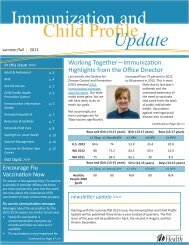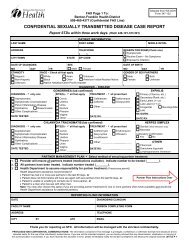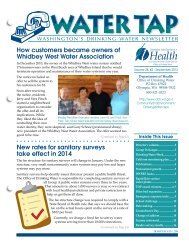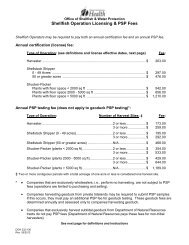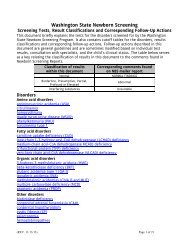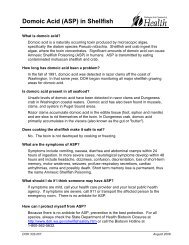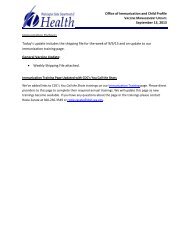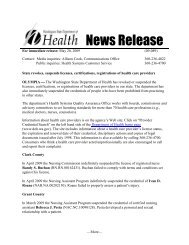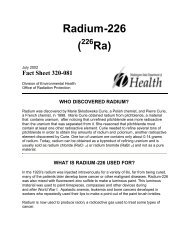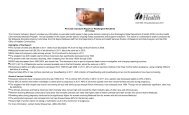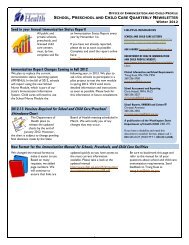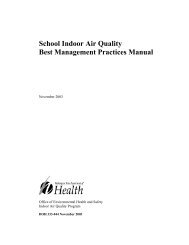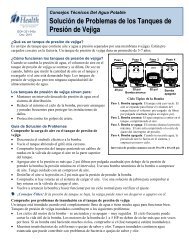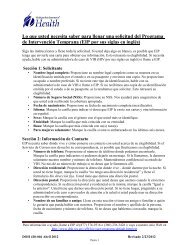Salmonellosis Reporting and Investigation Guideline - Washington ...
Salmonellosis Reporting and Investigation Guideline - Washington ...
Salmonellosis Reporting and Investigation Guideline - Washington ...
Create successful ePaper yourself
Turn your PDF publications into a flip-book with our unique Google optimized e-Paper software.
<strong>Salmonellosis</strong><br />
<strong>Reporting</strong> <strong>and</strong> Surveillance <strong>Guideline</strong>s<br />
4. Exclude cases from child care facilities until they are no longer symptomatic.<br />
5. If more than one case is suspected among attendees or workers at a child care facility,<br />
inspect the facility. The facility may have requirements for reporting outbreaks to<br />
Department of Early Learning.<br />
6. Instruct the operator to notify you immediately if new cases of diarrhea occur.<br />
7. Make follow-up contact with the child care center to assure that surveillance <strong>and</strong><br />
appropriate preventive measures are being carried out. Manage newly symptomatic<br />
children as outlined above.<br />
B. Case Resides at a Health Care or Residential Care Facility<br />
Determine if there has been any unusual incidence of diarrheal illness within the past<br />
month. If so, investigate these reports to identify possible common-source outbreaks or<br />
any continuing sources of exposure. If indicated, conduct a sanitary inspection of the<br />
facility. The extent of further investigation depends on circumstances. A facility may<br />
have requirements for reporting outbreaks to their licensing agency.<br />
7. ROUTINE PREVENTION<br />
A. Vaccine Recommendations: None<br />
B. Prevention Recommendations<br />
• Wash h<strong>and</strong>s after h<strong>and</strong>ling pets, pet wastes, pet treats made from animal products, fowl,<br />
other animals, raw meat, raw poultry, <strong>and</strong> always before food preparation.<br />
• Wash h<strong>and</strong>s after caring for diapered children, after using the toilet, <strong>and</strong> after h<strong>and</strong>ling<br />
soiled clothing or linens.<br />
• Do not eat raw eggs or foods containing raw eggs. Do not use dirty or cracked eggs.<br />
• Thoroughly cook eggs, poultry, <strong>and</strong> other foods of animal origin.<br />
• Avoid cross-contamination of ready to eat foods with raw foods of animal origin via<br />
cooking surfaces <strong>and</strong> utensils. Wash food preparation surfaces <strong>and</strong> utensils thoroughly<br />
after contact with raw meat or poultry.<br />
• Wash fruits <strong>and</strong> vegetables thoroughly before consumption. Peel when possible.<br />
• Avoid unpasteurized milk <strong>and</strong> other unpasteurized products including soft cheeses,<br />
juices, <strong>and</strong> cider.<br />
• Avoid drinking or swallowing untreated surface water. Untreated water should be boiled<br />
or otherwise disinfected before consumption.<br />
• Protect foods from rodent <strong>and</strong> insect contamination.<br />
• Discourage the use of chicks, ducklings, turtles, reptiles, <strong>and</strong> rodents as pets for small<br />
children.<br />
• Avoid direct or indirect contact between reptiles <strong>and</strong> infants or immunocompromised<br />
persons.<br />
Last Revised: January 2013<br />
Page 7 of 8<br />
<strong>Washington</strong> State Department of Health



